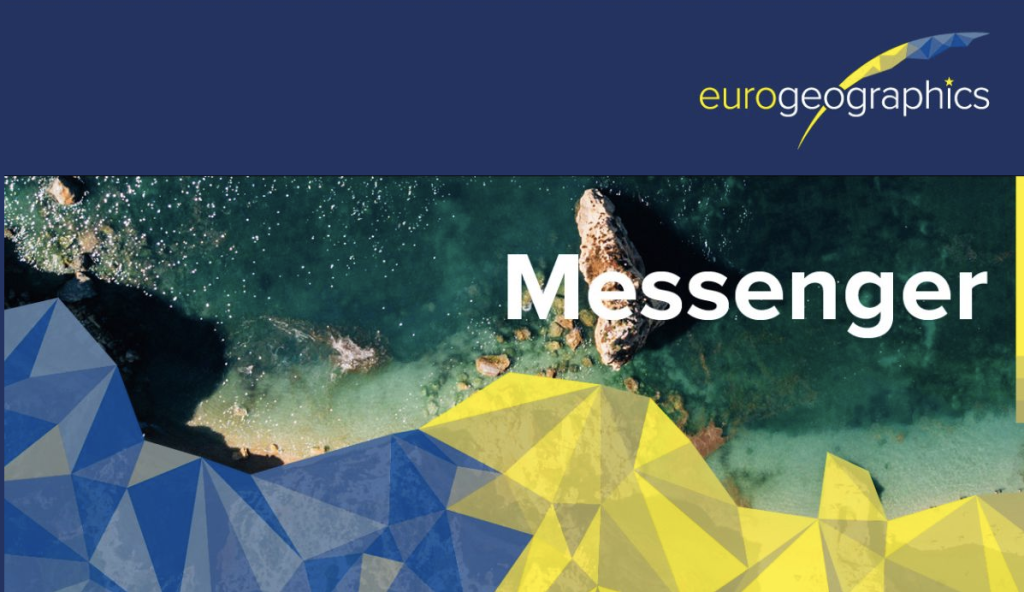Season’s Greetings

Wishing Season's Greetings to our members, partners and everyone who contributes to #MapsForEurope.
We look forward to working with you again in 2024 to promote the use, and demonstrate the value of, members' authoritative high value data.
Highlights of 2023
As we come to the end of the year, we are pleased to publish our 2023 Highlights.
In 2023, the Open Maps For Europe 2 (OME2) project, co-funded by the European Union, underpinned our activities as we continued to work with members to:
- Enable access to official high-value European geospatial data to provide fundamental information about location to find solutions for global challenges.
- Share expertise and best practice in pan-European data production and its integration into the infrastructures we rely upon as a modern society.
- Demonstrate the use and value of location to link information and action across national boundaries to benefit people and planet.
Data quality top priority as national providers of geospatial information adopt pragmatic approach to AI
Artificial intelligence (AI) is an opportunity to improve efficiency but data quality must be maintained to ensure accuracy is not compromised, say national providers of geospatial information.
More than half of the participants in third joint EuroGeographics – EuroSDR workshop said they were testing AI, or confirmed its small scale or moderate use within their organisations. They also identified machine learning as the most relevant technology for their activities, and cited security and accuracy as key issues that AI policy frameworks should consider.
“There is no doubt that AI is a technological game changer, indeed the majority of delegates agreed that it is inevitable that they would be using it extensively in the near future,” said Carol Agius, Head of Representation and Stakeholder Engagement, EuroGeographics which represents Europe’s National Mapping, Cadastral and Land Registry Authorities (NMCAs).
“As trusted providers of official geospatial information, the challenge for our members is to balance efficiency benefits with measures to ensure the continued accuracy, high quality and reliability of their data. Our discussions show that they are taking a prudent and pragmatic approach to the use of AI rather than falling for the hype.”
Joep Crompvoets, Secretary General of EuroSDR added: “The workshop’s discussions show that AI is not a silver bullet but a complimentary tool for the traditional methods used by NMCAs. To gain maximum benefit, they should invest in and use the technology by adopting a culture of GeoAI throughout their organisation.”
The 2023 workshop was organised by not-for-profit organisations, EuroGeographics, and EuroSDR, the European Spatial Data Research network that links NMCAs with Research Institutes and Universities.
It continued the conversation of AI within the context of NMCAs from events held in 2021 and 2022, and brought together producers, users, academia and software suppliers to debate spatial data quality, with a particular focus on the impact of new technologies.
Presentations are available here.
EuroGeographics is an international not-for-profit organisation (AISBL/ IVZW under Belgian Law. BCE registration: 833 607 112) and the membership association for the European National Mapping, Cadastral and Land Registry Authorities.
Role of trusted location data pinpointed as valuable resource to build a better future for all
Data from official national sources is one of Europe’s most valuable resources in achieving a sustainable, safer and fairer society, MEPs have heard.

Cristian Bușoi, MEP and Chair of Committee on Industry, Research and Energy (ITRE) highlights the importance of trusted data for the SDGs.
The showcase by members of EuroGeographics, the not-for-profit membership association for Europe’s National Mapping, Cadastral and Land Registry Authorities, highlighted their role providing fundamental information to implement the United Nations’ Sustainable Development Goals (SDGs). It featured examples from Belgium, France, Germany and The Netherlands to demonstrate how location connects people with place for sustainable development, tackling climate change, creating digital twins, and developing intelligent transport systems.
Opening the event in the European Parliament, host Cristian Bușoi, MEP and Chair of Committee on Industry, Research and Energy (ITRE) said: “Data holds tremendous importance for implementation of the SDGs; it enables us to monitor progress and shows us precisely where to intervene to gain momentum.”
“I commend the commitment of EuroGeographics, national geospatial information providers, and the UN-GGIM: Europe Executive Committee, to shape a stronger and more inclusive post 2030 development framework.”
“The European Union is putting great effort into enabling European citizens to live in dignity and peace, in a clean environment, and in economic prosperity. Full implementation of the UN’s 2030 Agenda is crucial to strengthen resilience and prepare for future potential shocks as we embark on the twin green and digital transitions.”
Colin Bray, President of EuroGeographics said: “The UN recognises that a strong global geospatial infrastructure is an essential enabler for achieving its 2030 Agenda.”
“To fully realise the benefits, we encourage even greater use of official geospatial data for the global indicators of the SDGs. And we strongly believe that geospatial information should be an integral component of the next development framework.”
“The Sustainable Development Goals Report 2023 Special Edition highlights data challenges, calls for more inclusive data for development, and states the need to strengthen coordination within national data ecosystems. The UN-endorsed Integrated Geospatial Information Framework – or IGIF, which is being implemented by many of our members, helps to address these issues.”
“The EuroGeographics-led project, Open Maps For Europe 2 (OME2) supports the ambitions of the IGIF by aligning the technical specifications for large-scale open data with the core recommendations for content proposed by UN-GGIM: Europe.”
OME2 provides a foundation for future pan-European high-value datasets. It is developing a new production process and technical specification for free-to-use, edge-matched, interoperable data under a single open licence to create a prototype dataset covering 10 countries. The data will be delivered via the user interface built by the award-winning Open Maps For Europe project which was completed in 2022. The two-year project is co-funded by the European Union.
Tomaz Petek, Chair of the European regional committee of experts for United Nations Global Geospatial Information Management – UN-GGIM: Europe, added: “Our work on the Sustainable Development Goals showcases the added value of integrating geospatial information with other data to address the indicators, and provides technical and methodological solutions for common challenges.”
“The integration of geospatial data in the next development framework will not only make it stronger and more inclusive, but will also help realise the aspirations held by people around the world for a better future. UN-GGIM: Europe is committed to playing its part in accelerating the achievement of the Sustainable Development Goals for present and future generations, turning our world towards a sustainable and resilient path by 2030.”
Mr Bray concluded: “Together with our members, we believe in a society empowered by the use of trusted geospatial data and services. Data from official national sources is therefore one of Europe’s most valuable resources in gaining momentum towards a sustainable, safer and fairer society.”
EuroGeographics is an international not-for-profit organisation (AISBL/ IVZW under Belgian Law. BCE registration: 833 607 112) and the membership association for the European National Mapping, Cadastral and Land Registry Authorities.
OME2 is co-funded by the European Union.
It is being delivered by a consortium comprising: EuroGeographics; National Geographic Institute, Belgium; National Institute of Geographic and Forest Information, France; Hellenic Cadastre; General Directorate for the Cadastre, Spain; and Cadastre, Land Registry and Mapping Agency, The Netherlands.
Open Maps For Europe ended in 2022. It was co-financed by the Connecting Europe Facility of the European Union, and coordinated by EuroGeographics in partnership with the National Geographic Institute (NGI) Belgium.
The contents of this publication are the sole responsibility of EuroGeographics and do not necessarily reflect the opinion of the European Union.
New head of EuroGeographics to focus on enabling access to high-value geospatial data from official national sources

Sallie Payne Snell has been appointed Secretary General and Executive Director of EuroGeographics
EuroGeographics has today (12 October 2023) announced Sallie Payne Snell as its new Secretary General and Executive Director.
Sallie, who previously led operations at the not-for-profit membership association, has an in-depth understanding of the technological, legislative and operational challenges and opportunities facing National Mapping, Cadastral and Land Information Authorities.
Commenting on her appointment, she said: “It is a privilege to represent official providers of the trusted geospatial information that is fundamental to the everyday lives of people across Europe.”
“My focus is on enabling access to members’ high-value data and expertise for the public good through its integration into the infrastructures we rely upon as a modern society.”
“EuroGeographics and its members are already delivering high-value pan-European data through the Open Maps for Europe interface. We look forward to building on this success through the OME2 project, which is co-funded by the European Union and responds to user needs for large-scale open data.”
President of EuroGeographics, Colin Bray added: “We are delighted that Sallie will lead EuroGeographics as we take our next steps in realising its vision of a society empowered by the use of trusted geospatial services from official national sources.”
“Sallie is a great champion of members’ data and expertise, and her extensive experience in relationship management will be key to further establishing partnerships with those who share our goal of using geospatial data for the public good. These collaborations are vital for meeting user requirements and finding solutions to common challenges.”
Sallie’s previous positions include Deputy Director, Association for Geographic Information, and International Stakeholder Relationship Manager, Ordnance Survey. She holds a BSc in geographical science.
EuroGeographics is an international not-for-profit organisation (AISBL/ IVZW under Belgian Law. BCE registration: 833 607 112) and the membership association for the European National Mapping, Cadastral and Land Registry Authorities.
The OME2 project is co-funded by the European Union. It is being delivered by a consortium comprising: EuroGeographics, the not-for-profit membership association for Europe’s National Mapping, Cadastral and Land Registration Authorities; National Geographic Institute, Belgium; National Institute of Geographic and Forest Information, France; Hellenic Cadastre; General Directorate for the Cadastre, Spain; and Cadastre, Land Registry and Mapping Agency, The Netherlands.
Views and opinions expressed are however those of the author only and do not necessarily reflect those of the European Union or European Commission. Neither the European Union nor the European Commission can be held responsible for them.
Open Maps For Europe was co-financed by the Connecting Europe Facility of the European Union and ended in 2022. It was coordinated by EuroGeographics, the voice of European National Mapping, Cadastral and Land Registration Authorities, in partnership with the National Geographic Institute (NGI) Belgium.
Issue 02/23 of Messenger Newsletter

The latest issue of our Messenger newsletter has been published.
Catch up on our latest news and subscribe to future editions.
EuroGeographics Interventions at GGIM13
One of the primary strengths of EuroGeographics – expertise in knowledge exchange and capacity development at a regional level – was key to its interventions at the thirteenth session of the United Nations Committee of Experts on Global Geospatial Information Management (UN-GGIM).
The Association's network links different players within the wider data ecosystem and it works in partnership with those who share its goal of using geospatial data to find solutions to global problems, such as UNGGIM. EuroGeographics reiterated its willingness to share this for the benefit of both the Committee and the Regional Committee in line with its Letter of Collaboration with UN-GGIM.
EuroGeographics interventions on the Agenda Items brought before the United Nations Committee of Experts on Global Geospatial Information Management at its Thirteenth Session
Agenda item #3. Enhancing global geospatial information management arrangements.
EuroGeographics would like to inform the Committee of Experts that we are remain committed to continue to resource and support the provision of the UN-GGIM: Europe secretariat through the renewal of our service level agreement with the Netherlands. We also continue to actively support the work and efforts of the Committee, to participate, collaborate and contribute in UN-GGIM activities as observers on both the global and European levels.
EuroGeographics would like to congratulate the Government of India and the UN-GGIM Secretariat for the success of the Second United Nations World Geospatial Information Congress, which held last October. We were pleased to support the Committee in the preparations of the Congress and would be happy to extend similar support in the future if required, including the Seventh High-level Forum on Global Geospatial Information Management in Mexico next year.
We are also pleased to note the side event on “Inclusion and diversity in geospatial information management” held at the side of this thirteenth session. EuroGeographics was proud to be one of the supporting organisations organising a special side event on the topic at the last Congress. Side events at the ninth and twelfth session focused on gender and women. All these events highlight the importance of gender equality, diversity and inclusion – which are cross cutting issues that permeate across all the work of the Committee of Experts.
Agenda item #4. Contribution of regional committees to the global geospatial information agenda
EuroGeographics would like to inform the Committee that we are making our online infrastructure and communications network available to support the delivery of the series of webinars organised by UN-GGIM: Europe. Four webinars have been organised so far, with a total participation of almost 500 people from 70 countries, including a number from outside Europe. More are planned in the coming months. We are happy to provide one of the key strengths of EuroGeographics – our expertise in knowledge exchange and capacity development at a regional level – for the benefit of the Committee and the Regional Committee.
We would also like to inform the Committee that EuroGeographics is leading an EU-funded project, Open Maps For Europe 2 (OME), which supports the ambitions of the UN Integrated Geospatial Information Framework (IGIF) by aligning the technical specification of the OME2 large-scale data prototype with UN-GGIM core recommendations for data. The project implements the fourteen core data themes, for which the UN-GGIM: Europe Working Group on Core Data proposed recommendations of content, in a practical context as the basis for the OME2 data model.
Agenda item #5. Contribution of thematic networks to the global geospatial information agenda
As an Association with a strong pillar of knowledge exchange activities, EuroGeographics appreciates the many capacity development activities undertaken by the thematic networks during the intersessional period. We would like to offer our support and network to extend some of our knowledge exchange activities with the broader UN-GGIM community. This would be in line with the Letter of Collaboration EuroGeographics signed with UN-GGIM last year.
As providers of pan-European data produced from our Members’ official national sources, EuroGeographics provide SALB with harmonised, open pan-European data which contributes to the ‘One United Nations Geospatial Situation Room’. We are also able to share our expertise in meeting the challenge of collating and producing trusted seamless data from disparate sources to be used for the public good.
Agenda item #6. The future geospatial information ecosystem
EuroGeographics thanks the Committee of Experts for considering the future geospatial information ecosystem. National Geospatial Information Agencies provide a framework to underpin the wider data ecosystem by bringing together data from a complex network of different players. As the association of European NMCAs, we believe that National Geospatial Information Agencies should champion the unique value of geospatial data and knowledge they deliver to society.
EuroGeographics would like to share that it provides an extensive and inclusive programme of knowledge exchange that links different players in the data ecosystem, in particular by establishing partnerships with those who share our goal of using geospatial data to find solutions to global problems. This includes our collaboration with UN-GGIM.
Agenda item #9. Geospatial information for sustainable development and climate resilience
The Sustainable Development Goals Report 2023 Special Edition highlights the data challenge for the SDGs and calls for more inclusive data for development. EuroGeographics agrees that more effort should be invested in coordinating and collating data for the SDGs to address the data and digital divide. It would also like to inform the Committee of Experts of its stakeholder engagement activities that demonstrate the integral role of official national geospatial data in the implementation and measurement of the SDGs to policy makers. Use cases are also available via our website.
EuroGeographics would like to suggest to the Committee of Experts that data geospatial data is integrated into the next development framework, thereby providing a stronger and more inclusive development framework beyond the 2030 Agenda.
Agenda item #10. Integration of geospatial, statistical and other related information
EuroGeographics would like to share with the Committee of Experts that it is supporting improved integration of geospatial and statistical data through a new agreement with Eurostat. This provides European National Statistical Institutions with access to the official pan-European administrative boundary data used by Eurostat for its reports. Furthermore, we are supporting users and stakeholders through a new knowledge exchange programme focussed on technical issues and topics.
EuroGeographics informs the Committee of its collaboration with UNSD that extends its knowledge exchange programme to the broader UN-GGIM community. This means that, together, we are helping to address key global challenges through capacity development. We are pleased to offer the Committee access to our programme through our collaboration with UN-GGIM to support implementation of the GSGF.
Agenda item #11. Application of geospatial information related to land administration and management
EuroGeographics has an active interest in this topic, especially through our ‘Knowledge Exchange Network on Cadastre and Land Registration’ composed of the cadastre and land registration organisations in Europe. We are open to possible cooperation and collaboration with the Expert Group, offering our network and successful knowledge exchange activities to further help raise awareness and knowledge of the FELA to a relevant and interested audience.
EuroGeographics informs the Committee that a large-scale Open Cadastral Map prototype is available via the Open Maps interface and is being enhanced as part of the OME2 project The map takes INSPIRE open data and allows the user to find out what is available from national sources in one place before obtaining the data from the official provider.
Agenda item #14. Policy and legal frameworks, including issues related to authoritative data
As the Member Association representing the European organisations nationally mandated to produce geospatial information, EuroGeographics has long been interested in the concepts and thinking in Europe on the notion of authoritative geospatial data. We strongly believe in a society empowered by trusted geospatial data from reliable sources, and welcome the paper on “Authoritative data in an evolving geospatial landscape: an exploration of policy and legal challenges”. We believe that, through its consultative process, this paper provides a through and global understanding of the meaning of ‘authoritative’ for the global geospatial context.
EuroGeographics notes that the Working Group is considering extending its consideration and efforts towards address authoritative “fit for purpose” geospatial data for crises and disasters. We would like to inform the Committee that its Framework Licence agreement with the European Environment Agency is improving access to authoritative geographic and land information. It is also exploring solutions for providing full, free, and open access to geospatial data for the Copernicus programme. Case studies are available on the website.
EuroGeographics would like to offer to host the next formal expert (in-person) meeting of the Working Group in Brussels Belgium in 2024, holding this meeting in collaboration with the EuroGeographics Policy Knowledge Exchange Network to maximise the participation and input from Members, relevant stakeholders and policy makers.
EuroGeographics calls for integration of trusted geospatial data in next global development framework
Geospatial data should be integrated into the next development framework to strengthen and make it more inclusive beyond the 2030 Agenda, says EuroGeographics.
The not-for-profit membership association for European National Mapping, Cadastral and Land Registration Authorities was speaking at the thirteenth session of the United Nations Committee of Experts on Global Geospatial Information Management (UN-GGIM).
During a series of interventions, EuroGeographics reiterated its commitment to sharing its extensive knowledge exchange network with the Committee, as well as offering support in facilitating access to official high-value European geospatial data and demonstrating its contribution to the public good. The Association also welcomed a new paper on authoritative data by UN-GGIM’s Working Group on Policy and Legal Frameworks for Geospatial Information, adding that it provides a thorough global understanding of the meaning.
“As the Member Association representing the European organisations nationally mandated to produce geospatial information, we strongly believe in a society empowered by trusted authoritative data from official national sources,” said Sallie Payne Snell, Acting Secretary General and Executive Director, EuroGeographics.
“Our collaboration with the United Nations Statistical Division provides a platform for sharing expertise and experience to unlock the power of geospatial data to benefit people and planet. We have extensive experience in establishing partnerships with those who share our goal and, to further support the Committee’s activities, we are committed to providing access to our knowledge exchange programme which links different players within the wider data ecosystem.”
Carol Agius, Head of Representation and Stakeholder Engagement, EuroGeographics, added: “The Sustainable Development Goals (SDGs) Report 2023 Special Edition highlights the data challenge for the SDGs and calls for more inclusive data for development. We agree with the Committee of Experts that more effort should be invested in coordinating and collating data for the SDGs to address both the information and digital divide.”
“As national providers of official geospatial information in Europe, our members’ data enables the connection between people and place, and plays a key role in measuring where progress is, or is not, being made. EuroGeographics therefore suggests to the Committee of Experts that geospatial data should be an integral component of the next development framework, and offers its support in enabling access to official high-value European geospatial data, sharing expertise and best practice, and demonstrating the use and value of location to provide a stronger and more inclusive development framework beyond the 2030 Agenda. “
EuroGeographics is an international not-for-profit organisation (AISBL/ IVZW under Belgian Law. BCE registration: 833 607 112) and the membership association for the European National Mapping, Cadastral and Land Registry Authorities.
